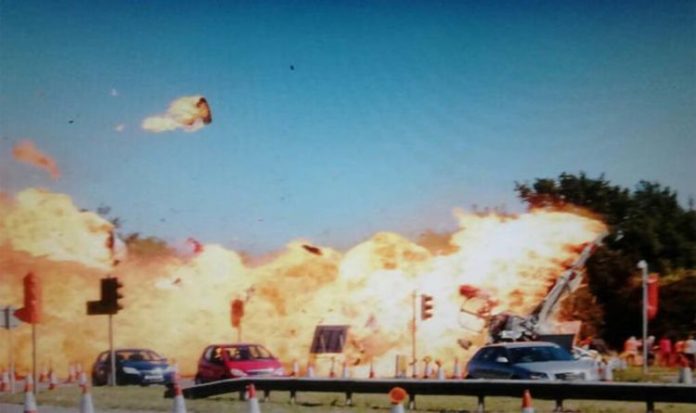Families have expressed their “disappointment” and “devastation” after a pilot was cleared over the deaths of 11 men in the Shoreham air crash.
Andrew Hill said he was “truly sorry” for losing control of his aircraft, resulting in the tragedy in England on August 22 2015.
He had been attempting a loop when his Hawker Hunter jet exploded into a fireball on the A27 in West Sussex.
Survivors ran for their lives and suffered terrible burns when they were caught in the blast on August 22, 2015.
Mr Hill miraculously survived after being thrown clear from the burning wreckage into brambles.
The prosecution said the former RAF and British Airways pilot had been flying too low and slow as he attempted the disastrous stunt.
Tom Kark QC alleged he had at times a “cavalier” attitude to safety and a history of taking risks, having played “fast and loose” with the rules in the past.
But Mr Hill said he blacked out in the air, having experienced “cognitive impairment” brought on by hypoxia possibly due to the effects of G-force.
The 54-year-old, of Sandon, Buntingford, Hertfordshire, denied 11 counts of manslaughter by gross negligence.
Victims’ families wept in court has Mr Hill was found not guilty after just over seven hours of jury deliberations.
Mr Justice Edis acknowledged they were “enormously upset” as he praised the “very dignified way” they conducted themselves throughout the trial.
Speaking outside court, Mr Hill said: “1,295 days ago, I lost control of an aircraft resulting in the deaths of Maurice Abrahams, Dylan Archer, Tony Brightwell, Graham Mallinson, Matthew Grimstone, Matt Jones, Daniele Polito, Mark Reeves, Jacob Schilt, Richard Smith, Mark Trussler. A number of people were injured.
“I’m truly sorry for the part I played in their deaths and it is they that I will remember for the rest of my life.”
Leslye Polito, the mother of crash victim Daniele Polito, 23, said she felt “disappointed, very upset and primarily let down by the justice system”.
Sue and Phil Grimstone, whose son Matthew, 23 also lost his life whist driving past on the A27, said they were “devastated”.
They said: “There seems to be no justice for our son Matthew and all 11 men who died in such tragic circumstances.
“Why are we allowing any form of aerobatics to be performed when there is now doubt concerning any pilot’s ability to avoid becoming cognitively impaired from the normal G forces that will be experienced during an aerobatic display?
“Matthew had no interest in airshows, he could not have cared less. Knowing he died because an aircraft was being flown for fun, for the entertainment of others, makes it even harder to bear.”
Sarah Stewart, a partner at Stewarts, who represents many of the bereaved families, called for a wider investigation to prevent future tragedies.
She said: “It is now almost four years since the Shoreham Airshow disaster killed 11 innocent men. The bereaved families have had to painfully re-live the circumstances of their loved ones’ death again and again.
“The families want answers and a verdict will go some way towards that. But it is only one part of the jigsaw.”
Rebecca Smith, of Irwin Mitchell, representing some of the others who were affected, added: “Now that the criminal proceedings have concluded attention will now turn to the inquest where the entirety of the Shoreham Airshow tragedy can be fully examined.”
The crash saw the greatest loss of life at an air show since 1952, when 31 people, including the pilot, were killed at Farnborough Airshow.
Prosecutors had claimed the 2015 crash was due to “pilot error” and although Mr Hill was normally considered “careful and competent”, he had taken “risks” in the past, suggesting he sometimes played “fast and loose” with the rules and may have had a “more cavalier attitude to safety than was appropriate”.
In 2017 a report by the Air Accidents Investigation Branch also found the disaster was caused by pilot error after the plane was too slow and too low during a loop manoeuvre.
But Mr Hill, an experienced former RAF instructor and British Airways captain, said he took a “very structured, disciplined approach” to display flying.
He told jurors he sometimes held back from flights he was not comfortable with carrying out, adding: “We have our strengths and weaknesses.”
Mr Hill said he thinks about the tragedy every day and it was a “dominant” thought in his mind. He said he never intended to cause any risk to anybody.
Some witnesses described him as “safety conscious” and an “absolute gentleman”.
Mr Hill said he was known for his planning and preparation before displays and footage from other airshows shows him carrying out a similar manoeuvre without issue.
He believes he experienced “cognitive impairment” shortly before the crash and does not remember what happened.
He told medics he “blacked out in the air” after he was found with blood on his face lying in undergrowth beside the cockpit.
He had a fractured nose, ribs and part of his lower spine, a collapsed lung, and serious bruising, among other injuries.
But he is now physically in good health.
The court heard medical checks before and after the crash have not established whether he had any condition which may have affected his health.








